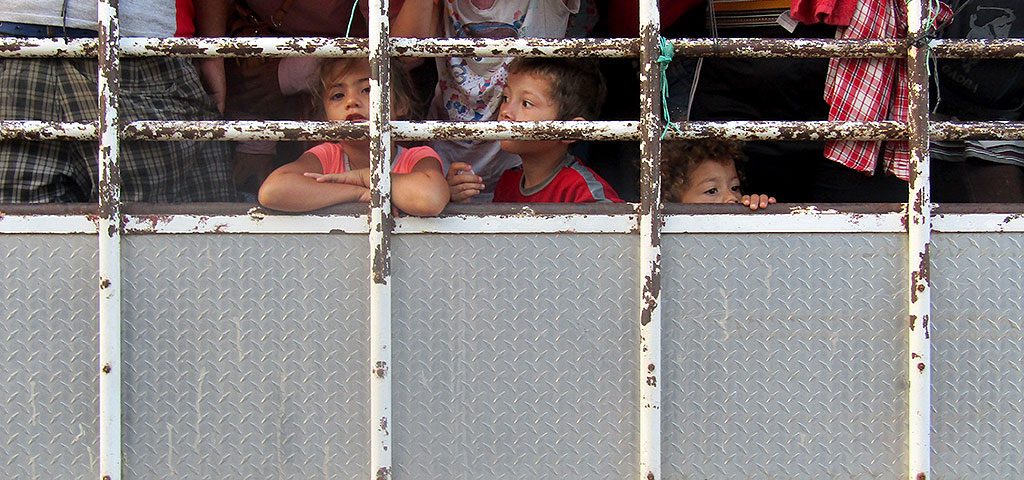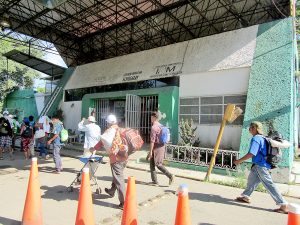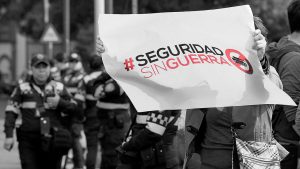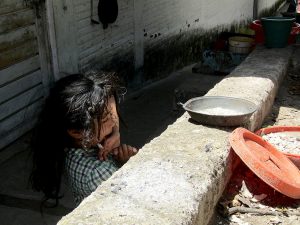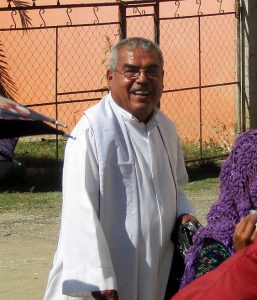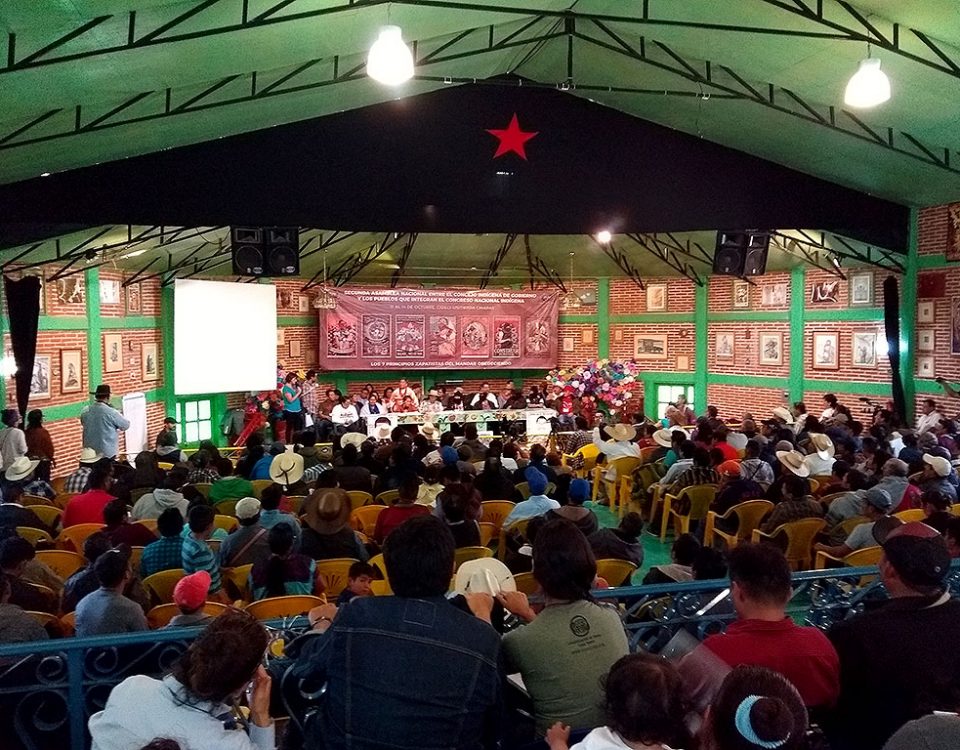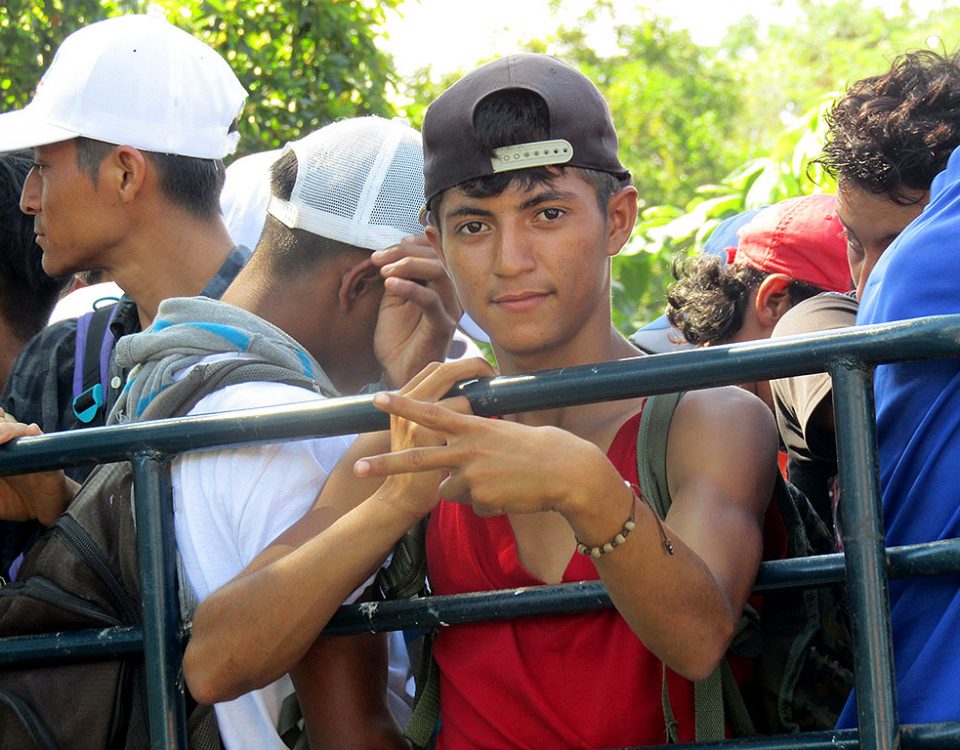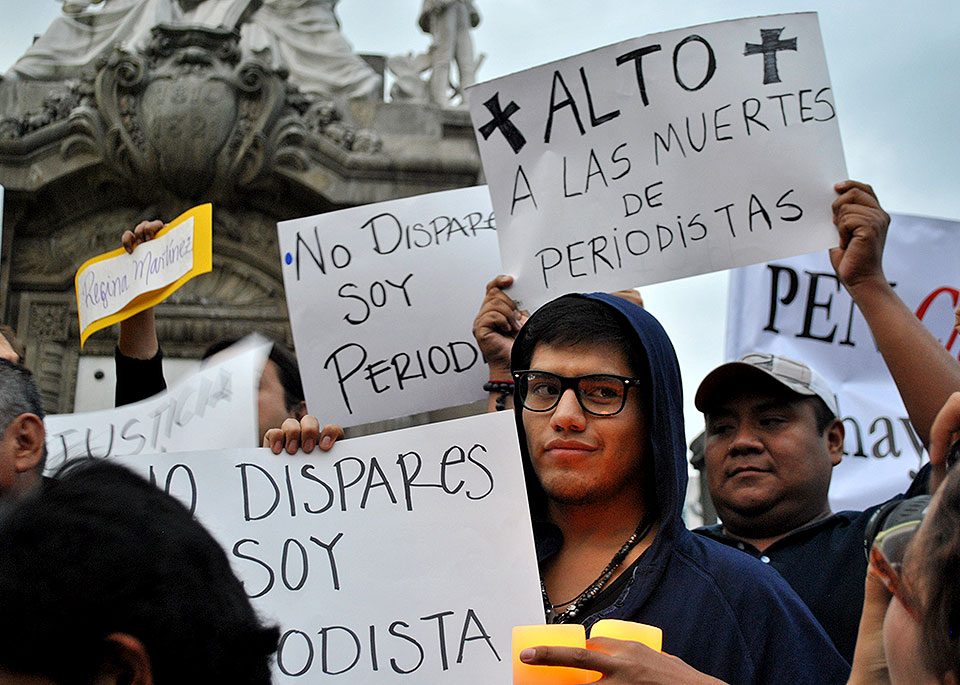Fund Appeal Letter
07/12/2018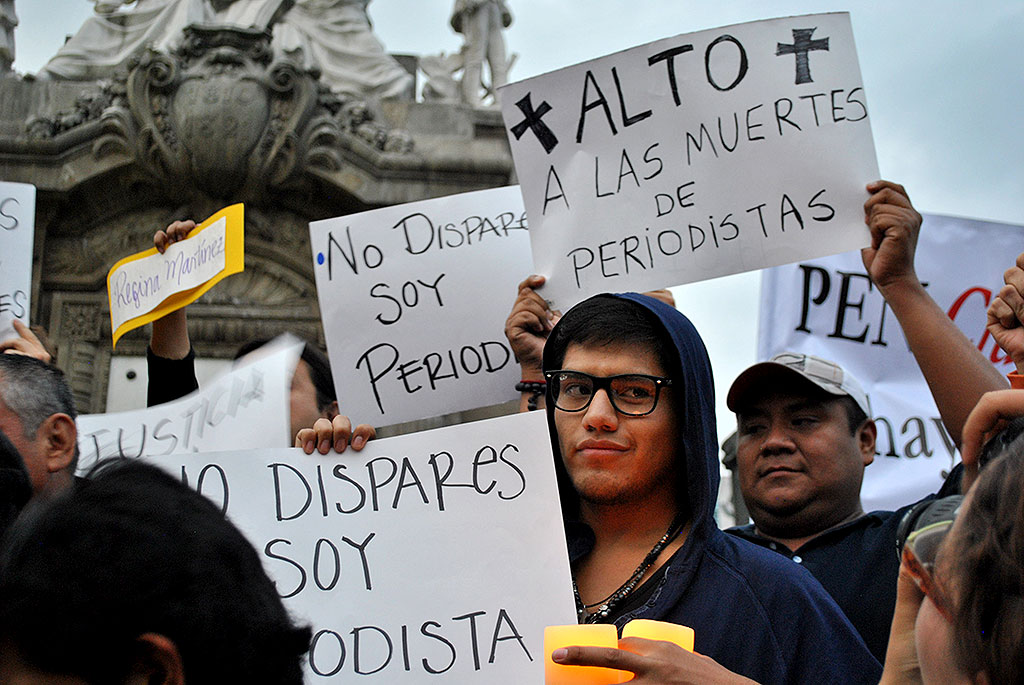
FOCUS: MEXICO – Freedom of expression under attack
11/12/2018Since October 19, thousands of migrants including women, children, and the elderly have begun entering Mexico in caravans with the intention of reaching the United States (see Article).
Several organizations with a presence on the southern border affirm that there is an exodus taking place- a humanitarian emergency in which “there is no coordination between the different levels of government (…) to provide a comprehensive and regional response to the situation.” These Caravans have provoked the anger of the President of the United States, Donald Trump, who has called on the Central American countries and Mexico to do everything necessary to stop the migrant groups, even threatening to suspend financial aid which the United States gives to these countries.
At first, the Mexican authorities sent federal police to the southern border to accompany an operation of the National Institute of Migration. A week later, the president of Mexico, Enrique Peña Nieto, announced a program for migrant care called “You Are at Home”, which provides medical care, education, temporary employment, and identification to those who have recently entered by the southern border. The program also imposes restrictions: applicants must be in Oaxaca and Chiapas and register their entrance or their request for refuge. “99% of the members of the caravan rejected the offer because it is specific to Chiapas and Oaxaca, states in a similar condition to the countries from which we come,” the organization Pueblos Sin Fronteras said.
By mid-November, the first groups of migrants began arriving at the U.S.-Mexican border in Tijuana. Even after reaching the border, uncertainty remains as they must cross the border through official access points in order to obtain refugee status, in accordance with a decree signed the previous week by Donald Trump. If Migrants cross the border anywhere other than an an official access point, they can be arrested, a disqualifier to remain in the country or seek asylum. The United States also announced operation “Faithful Patriot”, a deployment of 5,200 soldiers to the border with Mexico. The Mexican secretary of the Interior, Alfonso Navarrete Prida, said that the possibilities of entering the United States are “practically nil” and assured that the Mexican government will seek to prevent migrants from entering the country by force.
“Change and continuity” during the transition between two government cabinets
In September, President Enrique Peña Nieto (EPN) presented his last government report. He affirmed that he leaves a “prosperous and stable” country, after fulfilling “99% of his campaign proposals”. Regarding the fight against organized crime, he acknowledged that “the Government succeeded in reducing the operational capacity of these criminal organizations. But that the weakening of major criminal organizations led to the emergence of smaller criminal gangs, which the local police have been unable to challenge.” According to the digital newspaper Sin Embargo, EPN only fulfilled 49.5% of his promises: “Not only were the infrastructure works pending, [but also] the projects to recover security in the Mexican territory or the construction of the national anti-corruption system. (…) The government that is about to end achieved a historic record: the lowest approval percentage (…) of the last 30 years.”
The elected president Andres Manuel Lopez Obrador (AMLO) and his future cabinet have been omnipresent in the media supporting decisions and projects that they hope to implement. They have given contradictory and sometimes opposing signals to promises given during the election campaign. Statements and appointments in key positions of the future government make it clear that there will be no significant structural changes in the socioeconomic model that has prevailed in recent decades.
In August, AMLO reported that his government will continue with the policy that, since 2006, uses the armed forces in tasks of public security in the face of “the bitter reality” of violence in the country. He affirmed that “in the current circumstances there is no alternative” and that it would be “irresponsible” because it would leave the population “defenseless”. He added that his government will seek a gradual exit from these two forces, but that “no change is going to be made in the current public security law, as long as there are no results.”
The collective #SeguridadSinGuerra declared that “on the one hand, throughout the country Forums for Peace and Reconciliation are held, and on the other hand, fragments of the discourse we have heard during almost 12 years of war are repeated”. The collective also claimed “the absence of the commitment to repeal the Law of Internal Security, (…) increases the uncertainty about the will of the next government to stop militarization.”
In November, the National Commission for Human Rights (CNDH in its Spanish acronym) called on the Supreme Court of Justice of the Nation (SCJN in its Spanish acronym) to declare the Law of Internal Security unconstitutional. It emphasized that the participation of the armed forces in public security tasks “is not the appropriate response to deal with the crime rate (…) priority should be given instead to the development and training of police officers, financial intelligence, patrimonial investigation, the strengthening of prevention such as attention to inequalities, privileging and serving the exercise of social rights, as well as attention to arms trafficking.” The SCJN finally rejected the Law in its entirety.
However, AMLO’s “National Plan for Peace and Security 2018-2024” proposes the creation of a National Guard, which would be composed of between 120 and 200 thousand members. As soon as this plan was presented, human rights organizations began questioning it. Amnesty International stated that this plan is “worrying”, as it “essentially repeats the failed military security model”.
The risk of “trivialization” of consultation processes
As mentioned, AMLO proposed carrying out 43 consultation forums to lay the foundations for policies to achieve peace, including the legalization of some drugs, amnesty for some crimes, and the definition of the future role of the Army. Several organizations of victims and human rights have expressed their concern about the risk of participants being re-victimized or put at risk, or that the consultations are used to legitimize a pre-established agenda.
Other topics have also been opened for consultation. In October, AMLO announced that his government will cancel the construction of the New Mexico International Airport in Texcoco, and that it will instead support the construction of an airport in the current Santa Lucia military base. This comes after a national consultation in which more than one million people participated. EPN announced that his government will continue construction in Texcoco until the last day of his presidency. Businesses and opposition parties to the National Regeneration Movement (MORENA) have questioned the Santa Lucia proposal and the consultation process that they consider illegal, non-binding, and only a simulation to endorse a decision already made by AMLO. They believe that it will have a negative impact on financial markets and generate heavy economic losses.
The National Indigenous Congress (CNI) and the Zapatista Army of National Liberation (EZLN), have rejected the construction of a new airport regardless of its location: “Deciding where to put the new airport should not be what the governors ask us, if they felt any shame in front of the millions that suffer dispossession, poverty, repression, those who must migrate by the thousands because of the destruction left all over the world, on our Mother Earth who cannot bear more of the serious illness that capitalism has caused; the question should be if they continue or not along the road that is leading us, all of us, to death, to war, to extermination.”
In October, it was announced that a consultation will be held on the creation of the National Institute of Indigenous and Afro-Mexican Peoples. AMLO also announced that in May, consultations would be held for the Mayan Train, refineries in Tabasco and Oaxaca, and ten social programs.
The researcher Francisco Lopez Cardenas has questioned the tendency to trivialize the indigenous right to consultation: “If with previous governments, (…) the repeated tendency was to ignore indigenous peoples right to consultation, it seems that the incoming government will be the one to take it into account but outside international normative frameworks, only to legitimize governmental acts already decided in advance.”
“Considerable challenges” on the question of human rights
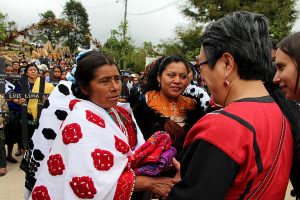
Visit of the United Nations Rapporteur on the Rights of the Indigenous Peoples to Chiapas © Fray Bartolomé de Las Casas Human Rights Center
In November, as part of the Universal Periodic Review (UPR) of the United Nations Human Rights Council, representatives of 108 countries asked questions and made recommendations to Mexico on this subject. The Mexican government delegation acknowledged that “considerable challenges” persist in the protection of human rights defenders and journalists, regarding torture, forced disappearances, violence against women and against migrants, as well as criminal impunity. The ColectivoEPUmx said that the participation of the States confirmed that the human rights crisis in Mexico persists. It called on the elected government to hold a public meeting once the recommendations were issued and to strengthen international cooperation for its implementation.
Since August, alerts have been issued about the absence of funds for the Mechanism for the Protection of Human Rights Defenders and Journalists. The Office of the United Nations High Commissioner for Human Rights (UNHCHR) stressed that it poses “a risk for the 959 current beneficiaries of the Mechanism; it would also mean that new people at risk could not receive protection.” The UN High Commissioner for Human Rights, Michelle Bachelet, deplored the number of defenders murdered in Mexico, and stressed that “many more have been victims of criminalization, abusive demands, smear campaigns, surveillance, death threats, and attacks. Last year was also the deadliest year for journalists in Mexico, with at least 12 murders.”
Also in September, the rapporteur on the Rights of Indigenous Peoples of the United Nations, Victoria Tauli-Corpuz, presented the Report on her visit to Mexico in 2017. In it she concludes that despite the international commitments made by Mexico, the context that remains is one of “Profound inequality, poverty, and discrimination of indigenous peoples that limit their access to justice, education, health, and other basic services.” She affirmed that current development policies based on megaprojects constitute “a major challenge” for the rights of indigenous peoples. “With regard to social and economic development, government institutions must substitute programs and policies with a welfare approach with those with a human rights focus and that promote empowerment, self-determination, and the priorities and proposals of these peoples,” she stated.
CHIAPAS: A one-of-a-kind post-electoral context
Breaking from tradition, the elections of July 1 were canceled in ten municipalities. Special elections will be held on November 25. Another notable event in September that was stopped in the end was the resignation of at least 30 women who had been elected at the municipal level or as representatives. It is feared that they were forced to resign, in order for their positions to be occupied by men.
In September, the Electoral and Political Participation Institute (IEPC) declared the implementation of a consultation to find out if Oxchuc’s municipal voting will take place through customary law. This occurred after the National Institute of Anthropology and History (INAH) concluded that the municipality has its own internal regulatory systems.
Another post-electoral incident occurred in August, when Manuel Velasco Coello asked for a license as governor to be sworn in as Senator of the Republic, a post he won for the Green Party. Days before, the Congress of Chiapas had modified several constitutional articles opening the possibility for him to return to the state government of Chiapas for a few months, before the inauguration of the governor-elect, Rutilio Escandon Cadenas. The Senate endorsed Velasco’s license to secede from his position as a legislator. Several analysts have indicated that this vote was given in exchange for the Green Party transferring five representatives to Morena, allowing the party headed by the president-elect to consolidate an absolute majority in the Chamber of Deputies.
Chiapas Highlands: The problem of forced displacement continues to grow
The Fray Bartolome de Las Casas Center for Human Rights (Frayba) has documented at least three attacks on inhabitants of the municipality of Aldama by armed civilian groups from the Manuel Utrilla ejido, municipality of Chenalho, between October and November, which is the reason the population of five communities of Aldama has remained in a situation of forced displacement since March 2018. Given the most recent events that stem from an unresolved agrarian conflict from 1977, Frayba demanded that the authorities intervene “urgently.” It called for “the implementation of an effective strategy to dismantle, disarm, arrest, and punish the armed civilian groups of Santa Martha Manuel Utrilla and thoroughly investigate the authorities responsible for the organization and actions of these groups.”
In October, the Congress of Chiapas approved a point of agreement regarding displaced persons in the state. It urged that the necessary actions be taken to guarantee their lives and integrity, and to enable their return. This motion was made after an 18-day sit-in, in front of Congress by members of the Coordinator of Displaced Persons of Chiapas.
However, the crisis of internal forced displacement in the highlands of Chiapas reached a new peak on November 7 when, in the community of Chavajeval, municipality of El Bosque, about two thousand people fled. The root of the displacement derives from a conflict between the residents of the community after the deaths of two people on October 24 from an ambush at the entrance of the community. The Fray Bartolome de Las Casas Center for Human Rights urged the government to “give preference to dialogue and resolution”; to “impartially and efficiently investigate the events that led to the displacement”; and to “address the humanitarian crisis”.
Advances and challenges regarding land and territory
Regarding Land and Territory, in August, the Ministry of Environment and Natural Resources (SEMARNAT) refused to grant permission for the Santo Domingo hydroelectric dam. Inhabitants of 51 communities in the municipality of Las Margaritas had rejected the project. In September, the First Forum Against Hydroelectric Dams in the Border Zone demanded the cancellation of the project. In October, the Federal Office of Environmental Protection (PROFEPA) suspended the mining project of Ejido Nueva Francia, municipality of Escuintla, for not having a permit to change land use.
In October, the National Indigenous Congress (CNI) held its second assembly in San Cristobal de Las Casas. More than 500 participants reported situations of violations of their rights in multiple parts of the country. They clearly distanced themselves from the incoming government and denounced the “continuity of neoliberal policy.” They stated that they will take the resolutions to their regions to consult the proposal “to continue building the organization that becomes a self-government, autonomous and rebellious, with compañeros from other regions, to collectively break the inertia imposed on us, to see among us all where the storm comes from and in the middle of it to not stop weaving, until our fabric joins with others, which sprout in all corners of Mexico and the world so that councils can be made, that together, we can be a council of government.”
In November, a pilgrimage was held in Chicomuselo against militarization and violence, and against threats against the parish priest. The Network for Peace expressed its concern over “the installation and operation of the military barracks recently inaugurated in Chicomuselo”, fearing “acts of intimidation and provocation” towards “those who accompany people, organizations and communities that have opted for the defense of life, for conditions of security, but without war and for the construction of peace with justice and dignity.”
OAXACA: Human rights “under attack”
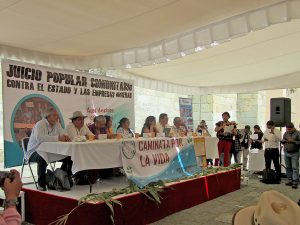
Popular community trial of extractive companies and the Mexican State, Oaxaca City, October 2018 © SIPAZ
In September, the Citizens’ Report “Under Attack, Human Rights in Oaxaca” was published. It stressed that the state is among the top three places in the country for attacks against human rights defenders and journalists, and in first place in the case of attacks against women defenders. It also emphasized the systematic use of the criminalization of social protest to silence the voices of resistance. As an example of these tendencies, the Committee for the Defense of Indigenous Peoples (CODEDI) denounced the murder of Noel Castillo Aguilar in October. It is the fifth murder of a CODEDI member in 2018.
People who defend the environment have been one of the most vulnerable sectors. In October, 50 indigenous communities and civil organizations put national and international extractive companies, as well as to the Mexican State, on “popular community trial” for violations of the rights of native peoples derived from the 322 concessions in the state. The jury requested the adoption of measures that guarantee the exercise of self-determination; the suspension of the delivery of mining titles (as long as a new legal framework is not drawn up); the repeal of the current Mining Law, and the approval of a new one that respects the rights of the people and moves to repair the violations that have occurred so far.
In October, civil organizations called on the SCJN to “protect the collective rights of the Zapotec community, and order the cancellation of the permits granted to Eolica del Sur for the construction of a wind turbine park in Juchitan.” The organizations encouraged the SCJN “not to discard the unique opportunity to generate a historical precedent in favor of the effective protection of the rights of indigenous peoples.” However, in November, the SCJN denied such an injunction. “It was able to protect the rights of indigenous peoples, but preferred to endorse a simulated consultation. Its decision in favor of a megaproject is contrary and regressive to the principles and standards of human rights,” Fundar criticized.
After the decree of the Alert of Gender Violence (GVA) in 40 municipalities of Oaxaca in September, femicides have continued in the state. Journalists and civil organizations have reported that there have still been more than 300 murders of women, 278 cases of forced disappearances, 146 rapes and 209 cases of political violence against women.
GUERRERO: Old and new challenges for defenders and journalists
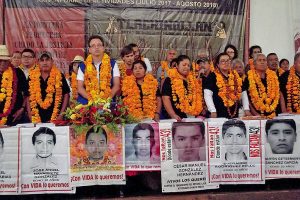
Ayotzinapa present at the 24th anniversary of the Montaña Tlachinollan Human Rights Center, October 2018 © SIPAZ
In September, four years after the forced disappearance of 43 students from the Normal Rural School of Ayotzinapa in Iguala, thousands of citizens took to the streets in several cities of the Republic to demand justice. On the same day, AMLO met with relatives of the victims and promised to clarify what happened through a Truth Commission, regardless of the decision of the courts. He also agreed to request assistance from the UN and the Inter-American Commission on Human Rights (IACHR). In June, a Mexican court ordered the creation of a Truth Commission to reopen the investigation, but the Attorney General’s Office (PGR) has declared that it is unable to do so.
Also regarding the justice system, weeks after the release of nine members of the Council of Ejidos and Communities against the Parota Dam (CECOP), the Regional Coordinator of Community Authorities – Community Police (CRAC-PC), and campesinos from the municipality of Acapulco, faced new persecution. The Tlachinollan Mountain Human Rights Center denounced that: “The Office of the Prosecutor has issued more than 50 arrest warrants against the same number of CECOP community members, whose crime has been defending their lands and their natural assets.”
Regarding freedom of expression, in October, Gabriel Soriano Kuri, a Radio and Television worker of Guerrero (RTG), was murdered. Article 19 reported that one day after the murder “a dismembered body was found (…) with a message that (…) says the following: “Here I am respected, asshole government, continue to have dealings with the CIDA (Acapulco Independent Cartel) and that’s how everyone will end up, be they journalists or government, they will suck my cock”. If politically motivated, “this homicide would be an unprecedented event, as it would confirm that drug trafficking is using the press as cannon fodder to politically pressure public authorities to achieve their ends. This would signal the beginning of a new form of organized crime violence against journalism,” it said.

